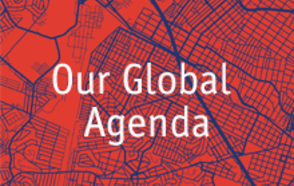Global Observatory on Local Democracy and Decentralization
The transformation that needs to be brought about to achieve the global agendas will only occur if our development model responds to the actual needs and expectations of communities. Yet for this to become a reality, it is necessary to instate the collective responsibility needed to make the necessary adjustments and sacrifices to achieve more equitable, fair and sustainable societies.
Global policies and the story of development are too often defined by the national perspective and fail to take into consideration the needs, experiences and skills of the communities. Through the Global Observatory on Local Democracy and Decentralization (GOLD), our organization works to establish a framework for monitoring and reporting on the progress made worldwide towards the implementation of the global sustainability agendas, with the objective of highlighting the efforts and potentialities of local and regional governments to address the global challenges facing our societies.

The essence of this work is materialized in different reports that bring the perspective of local and regional governments to the global conversation on key policy issues, such as Towards the Localization of SDGs, Rethinking Housing Policies, the 2019 Report of the World Observatory on Subnational Governments’ Finance and Investment, and the GOLD Report, UCLG’s flagship triennial publication. The fifth edition of the GOLD Report, The Localization of the Global Agendas, was launched in November 2019 during the UCLG World Congress, held in Durban.
Political Recommendations from GOLD V to the Municipal Movement
The GOLD V Report carries a critical yet hopeful message: global sustainability agendas will either be local or will simply not be. Fortunately, , the Report’s analysis shows that well-resourced localization strategies have the potential to propel fairer and sustainable local development -- that can in turn steer global development down the path of sustainability. The Report stresses that localization efforts need to be underpinned by multilevel governance frameworks that enable and propel local action that is inclusive of all actors, for which it proposes a set of recommendations addressed at local and regional, national and international levels. Briefly put, the Report’s keys to harnessing the potential of local action include:
Recommended actions to be implemented at the local and regional levels:
 Galvanize forces for the localization of the 2030 Agenda in our cities and territories.
Galvanize forces for the localization of the 2030 Agenda in our cities and territories.
 Protect the commons, human rights and culture as foundations of peace.
Protect the commons, human rights and culture as foundations of peace.
 Put human rights and the “Right to the City” at the core of the local development agendas, strengthening inclusive local policies to leave no one behind.
Put human rights and the “Right to the City” at the core of the local development agendas, strengthening inclusive local policies to leave no one behind.
 Harness the co-creation of cities and territories through sustainable participative urban and land planning.
Harness the co-creation of cities and territories through sustainable participative urban and land planning.
 Improve access to sustainable and inclusive public services in cities and territories.
Improve access to sustainable and inclusive public services in cities and territories.
 Focus on the future of jobs and local economic development (LED).
Focus on the future of jobs and local economic development (LED).
Recommended actions to be implemented at the global and national levels
 Foster a local-global movement to localize the SDGs.
Foster a local-global movement to localize the SDGs.
 Create an institutional environment that enables localization: empower local and regional governments and create adequate financing flows to support localization efforts.
Create an institutional environment that enables localization: empower local and regional governments and create adequate financing flows to support localization efforts.
 Effectively involve all spheres of government, civil society and key stakeholders to strengthen the localization process.
Effectively involve all spheres of government, civil society and key stakeholders to strengthen the localization process.
 Support the production and dissemination of disaggregated data for monitoring the localization of the global agendas.
Support the production and dissemination of disaggregated data for monitoring the localization of the global agendas.
 Develop a global governance system that brings together local and regional governments and the civil society to boost the implementation of the global agendas.
Develop a global governance system that brings together local and regional governments and the civil society to boost the implementation of the global agendas.













